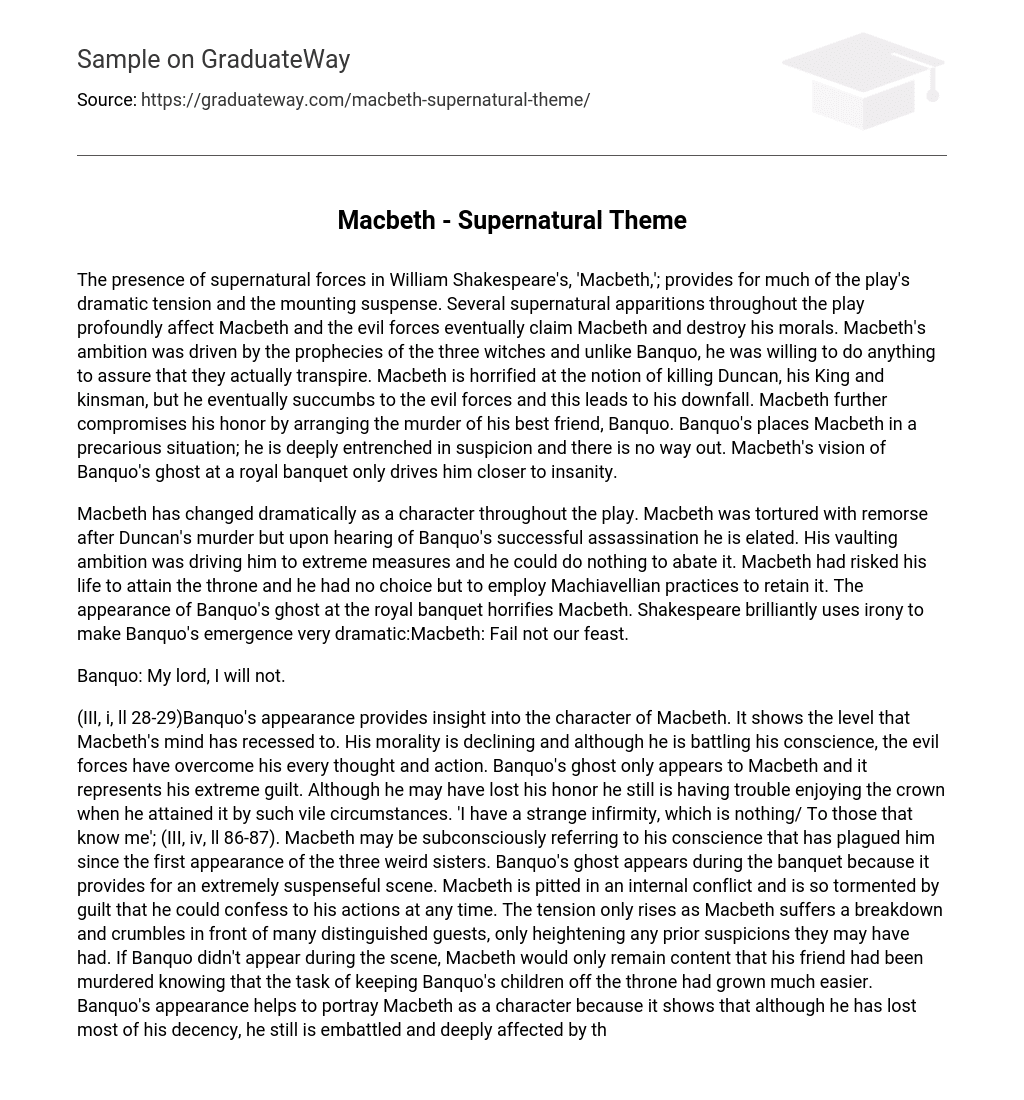The presence of supernatural forces in Shakespeare’s ‘Macbeth’ creates much of the play’s tension and suspense. These supernatural apparitions profoundly affect Macbeth and ultimately lead to his moral decay. Macbeth’s ambition is fueled by the prophecies of the three witches, and unlike Banquo, he is willing to do whatever it takes to ensure their fulfillment. Despite his initial horror at the idea of killing his King and kinsman, Duncan, Macbeth eventually succumbs to the evil forces, resulting in his downfall. Additionally, Macbeth compromises his honor by arranging the murder of his best friend, Banquo, who puts him in a difficult position of suspicion with no escape. The sight of Banquo’s ghost at a royal banquet pushes Macbeth further into insanity.
Throughout the play, Macbeth undergoes a significant character transformation. Initially, he was consumed with guilt following Duncan’s murder. However, upon learning of Banquo’s successful assassination, he becomes overjoyed. Macbeth’s insatiable ambition drives him to extreme measures that cannot be quelled. He is willing to risk his life in order to attain and maintain the throne, resorting to Machiavellian practices. The shocking appearance of Banquo’s ghost at the royal banquet deeply horrifies Macbeth. Shakespeare masterfully employs irony to heighten the dramatic impact of Banquo’s sudden presence.
Banquo adamantly refuses, saying, “My lord, I will not.”
Banquo’s presence in Macbeth provides insight into Macbeth’s character, revealing the decline of his morality and the overpowering nature of evil influences on his thoughts and actions. The appearance of Banquo’s ghost represents Macbeth’s intense guilt, causing him to struggle with finding joy in the crown he obtained through vile means. Macbeth may be referring to his troubled conscience when he mentions having a strange infirmity that only affects those who know him. Banquo’s ghost appearing during the banquet creates a highly suspenseful scene, as Macbeth is tormented by guilt and could potentially confess his actions. The tension escalates as Macbeth has a breakdown in front of distinguished guests, further increasing their suspicions. If Banquo did not appear, Macbeth would only remain content with his friend’s murder, knowing that eliminating Banquo’s children from the throne would become easier. The presence of Banquo helps portray Macbeth as a character who, despite losing much of his decency, is still deeply affected and embattled by the appearance of his deceased friend.Banquo’s appearance serves as an illustration of the supernatural, a significant theme in ‘Macbeth’. Macbeth, though powerful, is flawed, and the presence of these malevolent forces tempts him and plants the seed that leads to his own downfall. Despite being a formidable warrior, Macbeth is initially not portrayed as someone inclined to commit murder naturally. Macbeth is initially cautious about the prophetic messages from the three witches, but upon learning that he will become the Thane of Cawdor, he becomes convinced that he is destined for the throne. The witches are capable of corrupting Macbeth’s thoughts because his morals are not strong enough to resist temptation. Lady Macbeth also plays a crucial role as she persuades Macbeth to carry out these abhorrent acts. “To beguile the time, look like the time; bear welcome in your eye, your hand, your tongue: look innocent like a flower, but be cunning like a snake” (I, v, ll 61-64).
The supernatural forces in the play exert a much stronger influence than the individual characters. Although the witches may be evil, their prophecies hold truth. It is the wicked forces that eventually corrupt Macbeth. While the witches serve as an example of the evil forces at play, Macbeth is the one responsible for his actions and bears sole blame. Throughout ‘Macbeth,’ Shakespeare demonstrates how profoundly supernatural forces can impact characters by stripping them of their humanity. Macbeth falls victim to these malevolent forces and is deceived into self-destruction. Shakespeare’s portrayal of the supernatural offers a clearer and more insightful glimpse into Macbeth’s tormented psyche.





